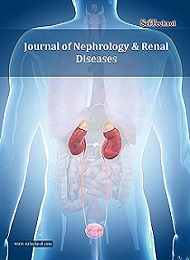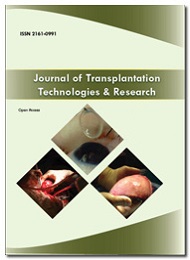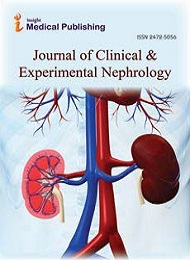Theme: Advancing Renal Health Worldwide Innovations and Insights
Nephrologists 2024
Conference Series LLC Ltd welcome you all to attend 25th Global Nephrology, Urology and Kidney Failure Congress (NEPHROLOGISTS 2024) which will be held during September 19-20, 2024 at Paris, France. We cordially invite all the participants who are interested in sharing their knowledge and research in the area of Nephrology. Nephrologists 2024 international conference is to ameliorate the knowledge, awareness, and education on Nephrology and Urology, leading to the discovery of Nephrology & Urology Therapies which aid to alleviate the human disease as it is the most significant emerging technology in the discriminations of Medical, Biotechnology, Pharmaceuticals, Hospitals and Academia. Nephrologists 2024 is an outstanding opportunity for the delegates from Universities and Institutes to interact with the world class Experts. Nephrology Conferences will provide a perfect platform to all the Doctors, Professors, Researchers, Business Delegates and Scientists to approach and deliver all the attendees about the latest scientific advancements on the respective sphere. International Nephrology Conferences strategic astuteness is to be an event for bringing together Scientists, Physicians, International mix of leading Universities, Nephrology Institutions to transform the practice of medicine by incorporating the use of Nephrology & Renal Therapies to control and treat.
Track 1: Nephrology
A nephron is the elementary and useful element of the kidney. Its central capacity is to manage the alliance of water and dissolvable substances like sodium salts by separating the blood, reabsorbing what is required and discharging the rest as pee. A nephron expels squanders from the body, accomplishes blood volume and weight, directs levels of electrolytes and metabolites, and controls blood pH. Its capacities are essential to life and are controlled by the endocrine framework by hormones, for example, antidiuretic hormone, aldosterone, and parathyroid hormone. In people, a characteristic kidney contains 800,000 to one million nephrons, Nephrology additionally incorporates hypertension, electrolyte unsettling influences and furthermore those individuals who require renal situation treatment that likewise incorporates renal transplant patients. A portion of the kidney maladies are foundational issue that are confined just to the organ yet can likewise require extraordinary treatment.
Recommended:
Nephrology Conferences | Euro Nephrology Events | Nephrology Meetings | Dialysis Conferences | Scientific Conferences on Nephrology | Renal Conferences | Clinical Nephrology Conferences | Kidney Transplant Conferences | Urology Conferences | Nephrology Conferences 2024 Europe | Kidney Disease Conferences | Chronic Kidney Disease Conferences | Renal Failure Conferences
Track 2: Pediatric Nephrology
The investigation of pediatric nephrology decides determination and supervision of babies with perpetual and intense kidney issue. The division of pediatric nephrology surveys and treats hypertension, hematuria, proteinuria, renal tubular acidosis, glomerulonephritis and kidney harm in youngsters. It similarly incorporate finish care to pediatric patients with end organize kidney disorders, including thought to patients facing peritoneal dialysis, hemodialysis and kidney transplantation in infants. Pediatric nephrology is a specialized field of medicine focused on the diagnosis, treatment, and management of kidney and urinary tract disorders in children. Pediatric nephrologists deal with a wide range of conditions, from congenital abnormalities and genetic disorders to acquired kidney diseases and acute or chronic renal failure, Chronic kidney disease in children can arise from congenital conditions, genetic disorders, or long-term complications of acute kidney injuries. Management of CKD involves regular monitoring, medication, dietary modifications, and sometimes dialysis or kidney transplantation. For children with end-stage renal disease, dialysis is a critical life-sustaining treatment. Pediatric nephrologists oversee both hemodialysis and peritoneal dialysis, tailoring the approach to the needs of each child.
Recommended:
Nephrology Conferences | Euro Nephrology Events | Nephrology Meetings | Dialysis Conferences | Scientific Conferences on Nephrology | Renal Conferences | Clinical Nephrology Conferences | Kidney Transplant Conferences | Urology Conferences | Nephrology Conferences 2024 Europe | Kidney Disease Conferences | Chronic Kidney Disease Conferences | Renal Failure Conferences
Track 3: Clinical Nephrology
Clinical Nephrology is the sub claim to fame of medicine that deals with the analysis of the working of the familiar kidney, issues in kidney functioning , treatment of the disparity from the norm in kidney functioning, renal transplantation and in addition kidney transplant techniques. Clinical nephrology is a specialized branch of internal medicine that deals with the study of normal kidney function, kidney problems, the treatment of kidney diseases, and renal replacement therapy (dialysis and kidney transplantation). The kidney is a vital organ with complex functions, including the regulation of electrolytes, maintenance of acid-base balance, and regulation of blood pressure. They serve the body as a natural filter of the blood, and remove wastes which are diverted to the urinary bladder. In producing urine, the kidneys excrete wastes such as urea and ammonium; they are also responsible for the reabsorption of water, glucose, and amino acids, Clinical nephrology is a specialized field within internal medicine that focuses on the diagnosis and treatment of kidney diseases. The kidneys play a critical role in maintaining homeostasis, including the regulation of electrolytes, blood pressure, and waste elimination. Nephrologists are trained to address a variety of conditions that affect kidney function, from acute kidney injuries to chronic kidney disease and end-stage renal disease requiring dialysis or transplantation.
Recommended:
Nephrology Conferences | Euro Nephrology Events | Nephrology Meetings | Dialysis Conferences | Scientific Conferences on Nephrology | Renal Conferences | Clinical Nephrology Conferences | Kidney Transplant Conferences | Urology Conferences | Nephrology Conferences 2024 Europe | Kidney Disease Conferences | Chronic Kidney Disease Conferences | Renal Failure Conferences
Track 4: Dialysis
Dialysis works on the objective of the dispersion of solutes and ultrafiltration of liquid over a semi-penetrable layer. Diffusion is a property of substances in water substances in water have a habit of to move from a territory of high fixation to a range of low focus. The two primary types of dialysis, Hemodialysis and Peritoneal dialysis eliminates wastes and water from the blood in numerous ways. Hemodialysis removes waste water by rotating blood outside the body through an external filter called a dialyzer that contains a semipermeable layer.
There is of types of dialysis they are:
1. Hemo dialysis 2. Peritoneal dialysis.
Hemodialysis: Hemodialysis essential with the patients of renal failure. In this procedure of Hemodialysis, an artificial kidney purifies blood. We have to make an "access," usually in the forearm where blood can easily be taken from the body and directed to an artificial kidney for purification. The access collects blood from patient body and experiences purification in artificial kidney and again injected the purified blood in to patient body, Peritoneal dialysis: In peritoneal dialysis no artificial kidney is used. The peritoneum (lining inside your abdomen) is used as a filter instead of an artificial kidney. Peritoneal dialysis is of two types they are continuous cycling peritoneal dialysis and constant ambulatory peritoneal dialysis. Peritoneal dialysis is used in kidney failure patients.
Recommended:
Nephrology Conferences | Euro Nephrology Events | Nephrology Meetings | Dialysis Conferences | Scientific Conferences on Nephrology | Renal Conferences | Clinical Nephrology Conferences | Kidney Transplant Conferences | Urology Conferences | Nephrology Conferences 2024 Europe | Kidney Disease Conferences | Chronic Kidney Disease Conferences | Renal Failure Conferences
Track 5: Kidney Transplantation
Kidney transplantation or renal transplantation is the organ transplant of a kidney into a patient with an end organise kidney diseases. Kidney transplantation is commonly named extinct donor known as cadaveric or living donor transplantation be depensnet on the wellspring of the giver organ. Living donor kidney transplants are formerly differentiated as non-related living transplants or, living associated transplants contingent upon whether a biological relationship occurs between the kidney donor and kidney recipient. Exchanges and chains are an innovative way to deal with nurtures the living donor pool, Kidney transplantation is a surgical procedure in which a healthy kidney from a donor is placed into a patient with end-stage renal disease (ESRD). This procedure is considered the most effective treatment for patients with kidney failure, offering better quality of life and survival rates compared to dialysis. Kidney transplantation involves complex processes, including donor matching, surgical techniques, and post-transplant care to ensure the best possible outcomes for the recipient.
Recommended:
Nephrology Conferences | Euro Nephrology Events | Nephrology Meetings | Dialysis Conferences | Scientific Conferences on Nephrology | Renal Conferences | Clinical Nephrology Conferences | Kidney Transplant Conferences | Urology Conferences | Nephrology Conferences 2024 Europe | Kidney Disease Conferences | Chronic Kidney Disease Conferences | Renal Failure Conferences
Track 6: Renal Nutrition
Diet and nutrition both play an important role for appropriate living and making a kidney function properly. If the functioning of kidney will obstruct due to some disease, it will also distress the nutrition intake of an individual. The major components which slow down the progress of chronic kidney diseases include reduced level of sodium intake, which will help in controlling blood pressure and managing diabetes. Renal nutrition, also known as kidney nutrition, focuses on dietary strategies designed to support kidney function, manage symptoms, and improve overall health in individuals with kidney disease. Proper nutrition plays a crucial role in managing chronic kidney disease (CKD), end-stage renal disease, and other renal conditions. Tailoring the diet according to the stage of kidney disease and individual needs can help slow disease progression, manage complications, and improve the quality of life for patients. Renal nutrition is a critical aspect of managing chronic kidney disease (CKD) and other kidney-related disorders. Proper dietary management can slow the progression of CKD, alleviate symptoms, and improve the overall quality of life for patients. Renal nutrition involves understanding the specific dietary needs of individuals with kidney disease, the role of nutrients and minerals, and how to tailor dietary plans to meet these needs.
Recommended:
Nephrology Conferences | Euro Nephrology Events | Nephrology Meetings | Dialysis Conferences | Scientific Conferences on Nephrology | Renal Conferences | Clinical Nephrology Conferences | Kidney Transplant Conferences | Urology Conferences | Nephrology Conferences 2024 Europe | Kidney Disease Conferences | Chronic Kidney Disease Conferences | Renal Failure Conferences
Track 7: Nephrology Nursing & Health Care
Nephrology nurses use the nursing process to care for patients of all ages who are undergoing, or are at risk for, kidney disease. Nephrology nursing involves both an inhibiting disease and an assessing the health needs of patients and families. Care spans the life cycle and involves patients who are facing the real or threatened impact of acute or chronic kidney disease; therefore nephrology nurses must be well-educated, highly skilled, and motivated, Nephrology nursing is a specialized field dedicated to the care of patients with kidney-related health issues, including chronic kidney disease (CKD), acute kidney injury (AKI), dialysis, and kidney transplantation. Nephrology nurses play a crucial role in managing the complexities of kidney disease, providing both clinical care and patient education to improve outcomes and quality of life for individuals with renal conditions. Nephrology nurses are responsible for a wide range of tasks, from monitoring patients' vital signs and administering dialysis treatments to managing medications and coordinating care with other healthcare professionals. They conduct thorough assessments to detect early signs of complications, ensure that patients adhere to their treatment regimens, and provide emotional support to patients and their families. Their expertise extends to creating personalized care plans that address the unique needs of each patient.
Recommended:
Nephrology Conferences | Euro Nephrology Events | Nephrology Meetings | Dialysis Conferences | Scientific Conferences on Nephrology | Renal Conferences | Clinical Nephrology Conferences | Kidney Transplant Conferences | Urology Conferences | Nephrology Conferences 2024 Europe | Kidney Disease Conferences | Chronic Kidney Disease Conferences | Renal Failure Conferences
Track 8: Kidney Diseases
Kidney disease, or renal disease, also known as nephropathy, is am imparement to or disease of a kidney. Nephritis is an inciting kidney disease and has several types according to the location of the inflammation. Inflammation can be diagnosed by blood tests. Nephrosis is non-inflammatory kidney disease. Nephritis and nephrosis can give intensification to nephritic syndrome and nephrotic syndrome respectively. Kidney disease habitually causes a loss of kidney function to some degree and can result in kidney failure, the complete loss of kidney function.
Acute kidney injury (AKI) is an unanticipated occurrence of kidney failure or kidney damage that follows within a few hours or a few days. AKI causes a build-up of waste yields in your blood and makes it tough for your kidneys to possess the right balance of fluid in your body.
End-stage renal disease also termed as chronic kidney diseases (CKD) an encompass conditions that impairment kidneys and weaken their ability to keep you hygienic by abnormal function. On condition kidney disease develops an inferior; wastes can accumulate to high levels in your blood and make you feel unpleasant. You may develop problems like anemia, high blood pressure, weak bones, nerve damage and poor dietary health.
Recommended:
Nephrology Conferences | Euro Nephrology Events | Nephrology Meetings | Dialysis Conferences | Scientific Conferences on Nephrology | Renal Conferences | Clinical Nephrology Conferences | Kidney Transplant Conferences | Urology Conferences | Nephrology Conferences 2024 Europe | Kidney Disease Conferences | Chronic Kidney Disease Conferences | Renal Failure Conferences
Track 9: Hypertension & Diabetic Associated Kidney Diseases
High blood pressure (hypertension) is one of the prime causes of diabetic kidney disease and kidney failure. When blood pressure is high, there is a large amount of strain inside the blood vessels that leads to impairment. These vessels may close off absolutely which can cause a heart attack, stroke, or kidney failure. High blood sugar and high cholesterol can also damage blood vessels. Thus people with diabetes who also have hypertension are at exclusively high risk for blood vessel damage. It usually takes years for blood vessels to utterly close off and damage to blood vessels can be slowed down or reversed with treatment. The kidneys filter blood to remove waste products and excess fluids, a process that relies on a network of tiny blood vessels. High blood pressure can cause these vessels to thicken and narrow, reducing blood flow to the kidneys. Over time, this diminished blood flow leads to scarring (glomerulosclerosis) and loss of kidney function. Furthermore, hypertension can cause damage to the renal arteries, leading to ischemic nephropathy, a condition where parts of the kidney become deprived of oxygen and nutrients, further impairing renal function, Effective management of hypertension and diabetes is crucial to preventing or slowing the progression of kidney disease. For hypertension, treatment typically involves lifestyle modifications such as dietary changes (reducing sodium intake), regular physical activity, weight management, and medications such as ACE inhibitors, ARBs, and diuretics to control blood pressure. For diabetes, maintaining optimal blood glucose levels through diet, exercise, and medications is essential.
Recommended:
Nephrology Conferences | Euro Nephrology Events | Nephrology Meetings | Dialysis Conferences | Scientific Conferences on Nephrology | Renal Conferences | Clinical Nephrology Conferences | Kidney Transplant Conferences | Urology Conferences | Nephrology Conferences 2024 Europe | Kidney Disease Conferences | Chronic Kidney Disease Conferences | Renal Failure Conferences
Track 10: Cardiovascular Impacts of Kidney Diseases
Chronic kidney disease prompts the risk of death from cardiovascular disease. Coronary disease result for more than half of all deaths among individuals with CKD (Chronic kidney diseases). Indeed, even early or mellow renal disorder puts a man at higher danger of heart ailments and heart attacks and also heart disease-related death. Kidney dialysis patients who also have cardiovascular disease are died 10 to 30 times more than in the over-all cardiovascular patients. Diabetes and hypertension are major risk causes for heart disease and chronic kidney disease. Kidney disease (acute kidney disease or chronic kidney disease) can persuade the risk of cardiovascular ill, even with hypertension, high cholesterol and concurrent diabetes. Contemporary researches show that kidney diseases (renal diseases) induce heart disease, even before the kidneys are impaired to the point of requiring dialysis or transplantation, The cardiovascular impacts of kidney diseases are profound and multifaceted, significantly increasing the risk of cardiovascular events such as heart attacks, strokes, and heart failure. Dysfunction of the kidneys leads to hypertension, fluid and electrolyte imbalances, and accelerated atherosclerosis, all of which contribute to cardiovascular complications. Chronic kidney disease (CKD) patients often develop left ventricular hypertrophy (LVH), coronary artery disease (CAD), arrhythmias, and heart failure, leading to elevated morbidity and mortality rates. End-stage renal disease (ESRD) and dialysis further exacerbate cardiovascular risks due to dialysis-related complications, accelerated atherosclerosis, and dialysis access issues. Managing and preventing cardiovascular complications in kidney disease patients requires a comprehensive approach, including aggressive blood pressure control, risk factor modification, medication management, and regular monitoring to mitigate the cardiovascular burden and improve patient outcomes.
Recommended:
Nephrology Conferences | Euro Nephrology Events | Nephrology Meetings | Dialysis Conferences | Scientific Conferences on Nephrology | Renal Conferences | Clinical Nephrology Conferences | Kidney Transplant Conferences | Urology Conferences | Nephrology Conferences 2024 Europe | Kidney Disease Conferences | Chronic Kidney Disease Conferences | Renal Failure Conferences
Track 11: Kidney and Bladder Stones
A branch of medicine which deals with the study of typical kidney function, kidney problems & their treatment, it also encompasses renal replacement therapies. Acute kidney failure: Dysfunction of the kidneys to filter the waste from the blood. Decreased urinary output, swelling due to urinary retention, nausea, shortness of breath is some of the symptoms. Acute tubular necrosis was expiry of the tubular epithelial of the renal tubules in the kidneys. An ingestion of nephrotoxic drugs & low blood pressure are the common causes. Every nephrologist has an usual extensive training in general internal medicine, and many nephrologists will treat their patients for other things also kidney problems. It’s important that patients express their kidney doctors if they notice any deviations in their health, Kidney and bladder stones, also known as renal and urinary calculi, are mineral deposits that form within the kidneys or bladder. These stones can vary in size, from tiny grains to larger masses, and can cause significant discomfort and complications when they obstruct the urinary tract. The formation of stones is typically attributed to the crystallization of minerals and salts found in urine, such as calcium oxalate, calcium phosphate, uric acid, and struvite. Various factors contribute to stone formation, including dehydration, diet high in certain substances (e.g., oxalates, purines), urinary tract infections, metabolic disorders, and genetic predisposition. Symptoms of kidney and bladder stones may include severe pain in the back, abdomen, or groin, accompanied by nausea, vomiting, hematuria (blood in urine), and frequent urination. Treatment options range from conservative measures such as increased fluid intake and pain management to more invasive interventions like lithotripsy (shock wave therapy), ureteroscopy, or surgical removal for larger stones. Prevention strategies often involve dietary modifications, hydration, and addressing underlying metabolic conditions to reduce the risk of stone recurrence. Early detection and prompt management are crucial in preventing complications and preserving kidney and bladder health.
Recommended:
Nephrology Conferences | Euro Nephrology Events | Nephrology Meetings | Dialysis Conferences | Scientific Conferences on Nephrology | Renal Conferences | Clinical Nephrology Conferences | Kidney Transplant Conferences | Urology Conferences | Nephrology Conferences 2024 Europe | Kidney Disease Conferences | Chronic Kidney Disease Conferences | Renal Failure Conferences
Track 12: Urology
The urinary and regenerative tracts are solidly associated, and clutters of one oftentimes impact the other. Along these lines, a range scope of the conditions regulated in urology exists under the region of genitourinary issue. Urology combines the organization of remedial and it is nonsurgical conditions, for example, urinary tract pollutions and altruistic prostatic hyperplasia, with the association of careful conditions. Models: Bladder or prostate tumour, kidney stones, hereditary changes, kidney harm, and stress incontinence, Urology is a medical specialty focused on the diagnosis, treatment, and management of conditions related to the urinary tract system in both males and females, as well as the male reproductive system. Urologists are highly trained physicians who address a wide range of urological disorders, including but not limited to urinary tract infections, kidney stones, bladder dysfunction, prostate diseases (such as benign prostatic hyperplasia and prostate cancer), erectile dysfunction, infertility, and urinary incontinence. They utilize various diagnostic techniques, including imaging studies, laboratory tests, and minimally invasive procedures, to assess and diagnose urological conditions accurately. Treatment modalities in urology span from medical management and lifestyle modifications to surgical interventions, such as minimally invasive procedures and open surgeries, depending on the nature and severity of the condition. Additionally, urologists often collaborate with other specialists, such as oncologists, nephrologists, and gynecologists, to provide comprehensive care for patients with complex urological issues. Overall, urology plays a crucial role in promoting urinary and reproductive health and improving the quality of life for individuals affected by urological conditions.
Recommended:
Nephrology Conferences | Euro Nephrology Events | Nephrology Meetings | Dialysis Conferences | Scientific Conferences on Nephrology | Renal Conferences | Clinical Nephrology Conferences | Kidney Transplant Conferences | Urology Conferences | Nephrology Conferences 2024 Europe | Kidney Disease Conferences | Chronic Kidney Disease Conferences | Renal Failure Conferences
Track 13: Urinary Tract Infections
A urinary tract infection (UTI) is an infection concerning the kidneys, ureters, bladder or urethra. An infection can occur in either the upper or lower urinary tract. As a rule, the higher up the infection, the more thoughtful it is. Further common in adults than children, urinary tract infections are second only to respiratory infections as the most common type of infection. Urinary tract infections (UTIs) are common bacterial infections that affect the urinary system, including the kidneys, ureters, bladder, and urethra. These infections typically occur when bacteria, most commonly Escherichia coli (E. coli) from the digestive tract, enter the urinary tract through the urethra and multiply in the bladder. UTIs can range in severity from mild, uncomplicated cases to more serious infections that involve the kidneys or bloodstream, The symptoms of a UTI vary depending on the part of the urinary tract affected but often include a strong, persistent urge to urinate, a burning sensation during urination, cloudy or foul-smelling urine, and pelvic pain or discomfort. In severe cases, individuals may experience fever, chills, nausea, and vomiting. UTIs are more common in women than men, with factors such as sexual activity, pregnancy, menopause, and certain medical conditions increasing the risk. Diagnosis of UTIs typically involves a urinalysis and urine culture to identify the presence of bacteria and determine the specific type causing the infection. Treatment usually consists of antibiotics targeted at the causative bacteria, with the choice of medication guided by the severity of symptoms, the type of bacteria involved, and any underlying health conditions. In addition to antibiotics, symptomatic relief measures such as increased fluid intake and pain management may be recommended.
Recommended:
Nephrology Conferences | Euro Nephrology Events | Nephrology Meetings | Dialysis Conferences | Scientific Conferences on Nephrology | Renal Conferences | Clinical Nephrology Conferences | Kidney Transplant Conferences | Urology Conferences | Nephrology Conferences 2024 Europe | Kidney Disease Conferences | Chronic Kidney Disease Conferences | Renal Failure Conferences
Track 14: Urologic Diseases
Our body contains a drainage system which is used to remove urine. The major composition of urine is wastes and water. The urinary track consists of kidneys, ureters, and bladders. In the process of normal urination, the urinary tract needs to work together in the systematic order. Urological diseases or conditions comprises of urinary tract infections, kidney stones, bladder control problems, and prostate problems, among others. The period of existence of certain urologic conditions is short span whereas the others are long-lasting. Urologic diseases encompass a wide range of conditions that affect the urinary tract system and male reproductive organs. These diseases can vary in severity and may include infections, structural abnormalities, functional disorders, and malignancies. Common urologic diseases include urinary tract infections (UTIs), kidney stones, benign prostatic hyperplasia (BPH), urinary incontinence, erectile dysfunction, and urologic cancers such as prostate, bladder, kidney, and testicular cancer. Urinary tract infections are among the most prevalent urologic diseases, affecting millions of individuals worldwide each year. These infections can occur in any part of the urinary tract, including the bladder (cystitis), urethra (urethritis), and kidneys (pyelonephritis), and are often caused by bacteria entering the urinary system. Symptoms may include frequent urination, painful urination, and lower abdominal discomfort.
Recommended:
Nephrology Conferences | Euro Nephrology Events | Nephrology Meetings | Dialysis Conferences | Scientific Conferences on Nephrology | Renal Conferences | Clinical Nephrology Conferences | Kidney Transplant Conferences | Urology Conferences | Nephrology Conferences 2024 Europe | Kidney Disease Conferences | Chronic Kidney Disease Conferences | Renal Failure Conferences
Track 15: Kidney Urology
Epidemic proportions have been reached in Kidney disease due to an increase in diabetes, hypertensive disease, and obesity. Urologic diseases include prostate cancer, the second-leading cause of cancer-related death in men. The urinary and reproductive tracts are closely linked, and disorders of one often affect the other. One of the primary concerns addressed in kidney urology is kidney stones, which are solid crystalline deposits that form in the kidneys and can cause severe pain and urinary obstruction. Urologists specializing in kidney urology are skilled in diagnosing kidney stones through imaging studies such as ultrasound, CT scans, and intravenous pyelography. Treatment options for kidney stones may include conservative measures such as increased fluid intake and pain management, as well as minimally invasive procedures like shock wave lithotripsy, ureteroscopy, and percutaneous nephrolithotomy to remove or break up stones. Another important aspect of kidney urology is the management of kidney cancer, which can originate in the renal parenchyma or renal pelvis. Urologists are trained in performing surgical procedures such as partial or radical nephrectomy to remove cancerous tumors while preserving kidney function whenever possible. Additionally, kidney urologists collaborate closely with oncologists and radiologists to develop comprehensive treatment plans that may include chemotherapy, immunotherapy, or targeted therapy for advanced cases of kidney cancer.
Recommended:
Nephrology Conferences | Euro Nephrology Events | Nephrology Meetings | Dialysis Conferences | Scientific Conferences on Nephrology | Renal Conferences | Clinical Nephrology Conferences | Kidney Transplant Conferences | Urology Conferences | Nephrology Conferences 2024 Europe | Kidney Disease Conferences | Chronic Kidney Disease Conferences | Renal Failure Conferences
Track 16: Pediatric Urology
Pediatric Urology is a surgical subspecialty majorly focuses on the management of genital and urinary problems that occur in children thereby comprising of the special emphasis on developmental problems which affects the kidneys, bladder, urethra or genital tract. Pediatric urology is a specialized branch of medicine dedicated to the diagnosis, treatment, and management of urinary tract and genital problems in children, from infancy through adolescence. This field encompasses a wide range of conditions, including congenital anomalies, urinary tract infections, voiding dysfunction, and urological cancers. Pediatric urologists possess specialized training and expertise in addressing the unique anatomical, physiological, and emotional needs of pediatric patients, ensuring comprehensive and compassionate care. Pediatric urologists often work closely with other specialists, including pediatric nephrologists, pediatricians, neonatologists, and geneticists, to provide comprehensive care for children with urological conditions. Collaboration with pediatric anesthesia and nursing teams is also essential to ensure the safety and comfort of pediatric patients undergoing surgical procedures. Additionally, pediatric urologists play a vital role in educating patients and families about their conditions, treatment options, and long-term management strategies, empowering them to make informed decisions about their care.
Recommended:
Nephrology Conferences | Euro Nephrology Events | Nephrology Meetings | Dialysis Conferences | Scientific Conferences on Nephrology | Renal Conferences | Clinical Nephrology Conferences | Kidney Transplant Conferences | Urology Conferences | Nephrology Conferences 2024 Europe | Kidney Disease Conferences | Chronic Kidney Disease Conferences | Renal Failure Conferences
Track 17: Glomerular Diseases
Glomerular disease reduces the ability of the kidneys to sustain a endure of certain substances in bloodstream. Generally, the kidneys should filter toxins out of the bloodstream and emanate them in the urine, but should keep red blood cells and protein in the bloodstream. In individuals with glomerular disease, red blood cells and protein might be expelled into the urine, while toxins may be reserved.Glomerular disease can occur by itself or may be associated with a fundamental medical condition that upsets other organ systems, such as lupus nephritis, diabetes, or certain infections. Glomerular disease can improve swiftly or develop gradually over a period of years. Treatment of glomerular disease depends upon its cause and type. Glomerular diseases encompass a group of conditions that affect the glomeruli, the tiny blood vessels in the kidneys responsible for filtering waste products and excess fluid from the blood. These diseases can disrupt the normal function of the glomeruli, leading to various symptoms and complications. Glomerular diseases may arise from a variety of causes, including immune system disorders, infections, genetic factors, and certain medications.
Recommended:
Nephrology Conferences | Euro Nephrology Events | Nephrology Meetings | Dialysis Conferences | Scientific Conferences on Nephrology | Renal Conferences | Clinical Nephrology Conferences | Kidney Transplant Conferences | Urology Conferences | Nephrology Conferences 2024 Europe | Kidney Disease Conferences | Chronic Kidney Disease Conferences | Renal Failure Conferences
Track 18: Tubular and Interstitial Diseases
Tubulointerstitial diseases are clinically diverse conditions that share similar features of tubular and interstitial injury. In severe and sustained cases, the entire kidney may turn out to be involved, with glomerular dysfunction and even renal failure. Tubular and interstitial diseases encompass a group of renal conditions that primarily affect the renal tubules and interstitium, the spaces between the tubules. Unlike glomerular diseases, which primarily involve the filtering units of the kidneys (glomeruli), tubular and interstitial diseases predominantly affect the tubular structures responsible for reabsorption and secretion of solutes, electrolytes, and water, as well as the interstitial tissue that supports the tubules, One of the hallmark features of tubular and interstitial diseases is tubulointerstitial fibrosis, a process characterized by the accumulation of scar tissue in the interstitial space. This fibrotic remodeling can impair kidney function by disrupting tubular integrity, impairing tubular transport functions, and compromising renal blood flow. Common causes of tubulointerstitial fibrosis include chronic inflammation, ischemia, toxic insults, and obstructive uropathies.
Recommended:
Nephrology Conferences | Euro Nephrology Events | Nephrology Meetings | Dialysis Conferences | Scientific Conferences on Nephrology | Renal Conferences | Clinical Nephrology Conferences | Kidney Transplant Conferences | Urology Conferences | Nephrology Conferences 2024 Europe | Kidney Disease Conferences | Chronic Kidney Disease Conferences | Renal Failure Conferences
Track 19: Hereditary Kidney Disorders
Some kidney diseases result from genetic factors. Polycystic Kidney Disease (PKD), for example, is a genetic disorder in which many cysts grow in the kidneys. PKD cysts can slowly switch much of the mass of the kidneys, decreasing kidney function and leading to kidney failure. Some kidney complications may show up even before birth. Examples contain autosomal receding PKD, a rare form of PKD, and other developing problems that interfere with the normal formation of the nephrons. The signs of kidney disease in children vary. A child may grow remarkably slowly, may vomit frequently, or may have back or side pain, Hereditary kidney disorders encompass a broad spectrum of genetic conditions that affect the structure and function of the kidneys. These disorders are caused by inherited mutations in specific genes, leading to abnormalities in renal development, filtration, tubular function, or electrolyte balance. While the severity and presentation of hereditary kidney disorders vary widely, they often result in chronic kidney disease (CKD) and may progress to end-stage renal disease (ESRD) over time. One of the most well-known hereditary kidney disorders is polycystic kidney disease (PKD), which includes autosomal dominant polycystic kidney disease (ADPKD) and autosomal recessive polycystic kidney disease (ARPKD). ADPKD is characterized by the development of numerous fluid-filled cysts in the kidneys, leading to kidney enlargement and eventual loss of function. ARPKD, on the other hand, typically presents in infancy or childhood with enlarged kidneys and congenital hepatic fibrosis.
Recommended:
Nephrology Conferences | Euro Nephrology Events | Nephrology Meetings | Dialysis Conferences | Scientific Conferences on Nephrology | Renal Conferences | Clinical Nephrology Conferences | Kidney Transplant Conferences | Urology Conferences | Nephrology Conferences 2024 Europe | Kidney Disease Conferences | Chronic Kidney Disease Conferences | Renal Failure Conferences
Track 20: Renal Pathology-Immunology
Renal pathology is a subspecialty of anatomic pathology that compacts with the diagnosis and classification of medical diseases (non-tumor) of the kidneys. In the theoretical setting, renal pathologists work closely with nephrologists and transplant surgeons, who typically obtain diagnostic specimens via percutaneous renal biopsy. The renal pathologist must synthesize outcomes from light microscopy, electron microscopy, and immunofluorescence to obtain a conclusive diagnosis. Medical renal diseases may affect the glomerulus, the tubules and interstitial, the vessels, or a combination of these compartments, Kidney biopsies (renal biopsy) permit us to analyse renal disorders; review anticipations; help in the resolve of a precise remedial approach; and screen ailment movement in both local and allograft transplant kidneys. To outstandingly misuse renal biopsy examples, a blend of light, immunofluorescence and electron microscopy is used. Each microscopy requires distinctive approaches for fixation and preparing, so each renal biopsy centres are universally separated into three sections. Liable upon the length of the biopsy centre or suspected illness process; in any case, the strategy for partitioning the biopsy centre might be altered. Renal pathology-immunology is a specialized field within nephrology that focuses on the study of the pathological processes and immunological mechanisms underlying kidney diseases. It encompasses the examination of kidney tissue samples (biopsies) to diagnose and classify various renal disorders based on their histological features and immune-mediated changes. Understanding renal pathology-immunology is essential for accurate diagnosis, prognosis, and treatment planning in patients with kidney diseases.
Recommended:
Nephrology Conferences | Euro Nephrology Events | Nephrology Meetings | Dialysis Conferences | Scientific Conferences on Nephrology | Renal Conferences | Clinical Nephrology Conferences | Kidney Transplant Conferences | Urology Conferences | Nephrology Conferences 2024 Europe | Kidney Disease Conferences | Chronic Kidney Disease Conferences | Renal Failure Conferences
Track 21: Nephrological Treatment
Nephrological treatment consists of Steroid medications, blood products, dialysis and plasma exchange. Kidney complications can have significant impact on quality and length of life, and so psychological support, health education and advanced care planning play key roles in nephrology. Nephrological treatment encompasses a broad spectrum of interventions aimed at diagnosing, managing, and preventing kidney-related disorders. It encompasses medical, surgical, and supportive therapies tailored to the specific needs of patients with conditions ranging from acute kidney injury (AKI) to end-stage renal disease (ESRD). Nephrological treatment begins with a thorough diagnostic evaluation, which may include laboratory tests to assess kidney function (such as serum creatinine and estimated glomerular filtration rate), urine tests for proteinuria and hematuria, imaging studies (ultrasound, CT scan, MRI) to evaluate kidney structure, and kidney biopsy for definitive diagnosis in certain cases.Medical treatment in nephrology focuses on addressing the underlying cause of kidney dysfunction, managing complications, and preserving renal function. This may involve pharmacological interventions to control blood pressure, manage electrolyte imbalances, treat underlying conditions such as diabetes or autoimmune disorders, and alleviate symptoms such as edema and uremia.
Recommended:
Nephrology Conferences | Euro Nephrology Events | Nephrology Meetings | Dialysis Conferences | Scientific Conferences on Nephrology | Renal Conferences | Clinical Nephrology Conferences | Kidney Transplant Conferences | Urology Conferences | Nephrology Conferences 2024 Europe | Kidney Disease Conferences | Chronic Kidney Disease Conferences | Renal Failure Conferences
Track 22: New Updates in Nephrology and Hypertension
Hypertension is generally basic among patients experiencing ceaseless kidney infection (CKD) and diabetes mellitus. Hypertension is transcendent in many people with diabetic kidney malady (DKD). Inability to treat hypertension suitably in this sub-gathering of patients brings about a more serious danger of cardiovascular high blood glucose, additionally called glucose, can harm the veins in the kidneys. At the point when the veins get harmed, they don't work appropriately such a significant number of individuals with diabetes grow hypertension, which can harm kidneys. Diabetic kidney sickness is characterized as macro albuminuria (egg whites to keratinise proportion [ACR] >35 mg/moll [400 mg/g]), or micro albuminuria (ACR 3.5-35.0 mg/mmol [35-400 mg/g]) related with retinopathy (type 1 diabetes or type 2 diabetes) as well as >11 years' length of type 1 diabetes mellitus (T1DM). In many patients with diabetes, incessant kidney ailment can be owing to diabetes mellitus if these criteria are met. Different reasons for diabetic kidney illnesses ought to be considered within the sight of any of the accompanying conditions: quickly diminishing GFR, nonappearance of diabetic retinopathy, nearness of dynamic urinary dregs, or signs or side effects of another foundational malady, Advancements in nephrology and hypertension research and treatment continue to emerge, offering promising avenues for improving patient care and outcomes. Recent updates in these fields encompass a range of areas, from innovative therapies to novel diagnostic techniques and evolving understandings of disease mechanisms.
Recommended:
Nephrology Conferences | Euro Nephrology Events | Nephrology Meetings | Dialysis Conferences | Scientific Conferences on Nephrology | Renal Conferences | Clinical Nephrology Conferences | Kidney Transplant Conferences | Urology Conferences | Nephrology Conferences 2024 Europe | Kidney Disease Conferences | Chronic Kidney Disease Conferences | Renal Failure Conferences
Scope and Importance of Nephrology Research
According to recent statistics report, approximately 14% of total population are suffering from Chronic Kidney Disease complaints and millions of others are at augmented risk. The numbers of Kidney transplantations are apparently very high, there are about 121678 kidney transplantations. Due to the hasty increase for the risk of renal disorders, Nephrology Conference aims to decrease the frequency rate of kidney disease through its international conference on nephrology and warmly welcomes participants across the globe to discuss and arrive under possible solutions for one of the major critical problems of mankind.
The global nephrology devices market accounted for $12,012 million in 2018 and is expected to reach $16,421 million by 2026, registering a CAGR of 4.0% from 2019 to 2026. Nephrology is a branch of medical science, which deals with the study of functions and diseases associated with kidneys along with their treatment.
Nephrologists 2023 aims to bring together leading academic scientists, researchers and research scholars to exchange and share their experiences and research results about all aspects of Nephrology. It also delivers the chance for researchers, practitioners and educators to present and confer the most recent innovations, trends, and concerns, practical challenges encountered and the solutions implemented in the fields of Pediatric Nephrology and urology. We bring together industrial executives, Nephrology, Pharma and Health care sectors making the conference an impeccable platform to network, share views and knowledge through interactive discussions.These technologies enable continuous monitoring of vital parameters, early detection of complications, and personalized treatment approaches, thereby improving patient outcomes and enhancing the efficiency of nephrology practices. Furthermore, the shift towards value-based care models and emphasis on preventive nephrology are driving investments in early detection, disease management, and patient education initiatives. Telemedicine and digital health solutions are also gaining prominence, facilitating remote consultations, telemonitoring, and patient engagement, particularly in underserved regions and rural areas. In addition to traditional nephrology products and services, there is growing interest in regenerative medicine approaches, biomarker-based diagnostics, and precision therapies targeting specific molecular pathways associated with kidney diseases. These advancements offer promising avenues for improving treatment outcomes, reducing complications, and ultimately, improving the quality of life for patients with kidney diseases. However, the nephrology market also faces challenges such as reimbursement issues, healthcare disparities, and regulatory constraints. Nonetheless, with ongoing research, technological innovation, and collaborative efforts across academia, industry, and healthcare providers, the nephrology market is poised for continued growth and innovation, aiming to address the evolving needs of patients with kidney diseases worldwide.
Conference Highlights
- Nephrology
- Pediatric Nephrology
- Clinical Nephrology
- Dialysis
- Kidney Transplantation
- Renal Nutrition
- Nephrology Nursing & Health Care
- Kidney Diseases
- Hypertension & Diabetic Associated Kidney Diseases
- Cardiovascular Impacts of Kidney Diseases
- Kidney and Bladder Stones
- Urology
- Urinary Tract Infections
- Urologic Diseases
- Kidney Urology
- Pediatric Urology
- Glomerular Diseases
- Tubular and Interstitial Diseases
- Hereditary Kidney Disorders
- Renal Pathology-Immunology
- Nephrological Treatment
- Nephrology and Hypertension
To share your views and research, please click here to register for the Conference.
To Collaborate Scientific Professionals around the World
| Conference Date | September 19-20, 2024 | ||
| Sponsors & Exhibitors |
|
||
| Speaker Opportunity Closed | Day 1 | ||
| Poster Opportunity Closed | Click Here to View | ||
Useful Links
Special Issues
All accepted abstracts will be published in respective Our International Journals.
- Journal of Nephrology & Renal Diseases
- Transplantation Technologies & Research
- Journal of Clinical & Experimental Nephrology
Abstracts will be provided with Digital Object Identifier by


























